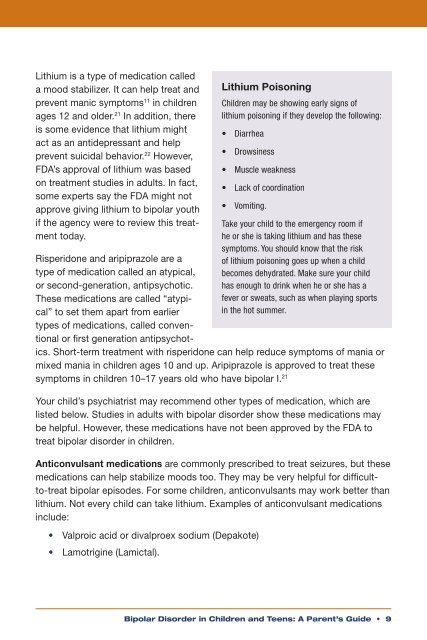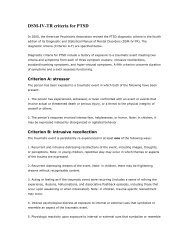Bipolar Disorder in Children and Teens: A Parent's Guide (PDF)
Bipolar Disorder in Children and Teens: A Parent's Guide (PDF)
Bipolar Disorder in Children and Teens: A Parent's Guide (PDF)
You also want an ePaper? Increase the reach of your titles
YUMPU automatically turns print PDFs into web optimized ePapers that Google loves.
Lithium is a type of medication calleda mood stabilizer. It can help treat <strong>and</strong>prevent manic symptoms 11 <strong>in</strong> childrenages 12 <strong>and</strong> older. 21 In addition, thereis some evidence that lithium mightact as an antidepressant <strong>and</strong> helpprevent suicidal behavior. 22 However,FDA’s approval of lithium was basedon treatment studies <strong>in</strong> adults. In fact,some experts say the FDA might notapprove giv<strong>in</strong>g lithium to bipolar youthif the agency were to review this treatmenttoday.Risperidone <strong>and</strong> aripiprazole are atype of medication called an atypical,or second-generation, antipsychotic.These medications are called “atypical”to set them apart from earliertypes of medications, called conventionalor first generation antipsychotics.Short-term treatment with risperidone can help reduce symptoms of mania ormixed mania <strong>in</strong> children ages 10 <strong>and</strong> up. Aripiprazole is approved to treat thesesymptoms <strong>in</strong> children 10–17 years old who have bipolar I. 21Your child’s psychiatrist may recommend other types of medication, which arelisted below. Studies <strong>in</strong> adults with bipolar disorder show these medications maybe helpful. However, these medications have not been approved by the FDA totreat bipolar disorder <strong>in</strong> children.Anticonvulsant medications are commonly prescribed to treat seizures, but thesemedications can help stabilize moods too. They may be very helpful for difficultto-treatbipolar episodes. For some children, anticonvulsants may work better thanlithium. Not every child can take lithium. Examples of anticonvulsant medications<strong>in</strong>clude:• Valproic acid or divalproex sodium (Depakote)• Lamotrig<strong>in</strong>e (Lamictal).Lithium Poison<strong>in</strong>g<strong>Children</strong> may be show<strong>in</strong>g early signs oflithium poison<strong>in</strong>g if they develop the follow<strong>in</strong>g:• Diarrhea• Drows<strong>in</strong>ess• Muscle weakness• Lack of coord<strong>in</strong>ation• Vomit<strong>in</strong>g.Take your child to the emergency room ifhe or she is tak<strong>in</strong>g lithium <strong>and</strong> has thesesymptoms. You should know that the riskof lithium poison<strong>in</strong>g goes up when a childbecomes dehydrated. Make sure your childhas enough to dr<strong>in</strong>k when he or she has afever or sweats, such as when play<strong>in</strong>g sports<strong>in</strong> the hot summer.<strong>Bipolar</strong> <strong>Disorder</strong> <strong>in</strong> <strong>Children</strong> <strong>and</strong> <strong>Teens</strong>: A Parent’s <strong>Guide</strong> • 9



